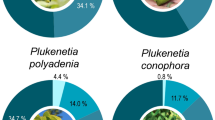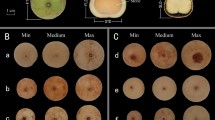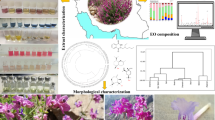Abstract
THE seeds which form the subject of this communication are obtained from Herrania spp. (Sterculiaceæ), which are indigenous to the Amazon valley. They were included in a collection of Theobroma spp. received from Trinidad in 1944, when they were planted in Accra Quarantine Station; the seedlings were planted in the field at Tafo in June 1945. These Herrania spp. have been provisionally classified as H. balaënsis Preuss, H. mariæ sp. “A” and Herrania sp. “B”.
This is a preview of subscription content, access via your institution
Access options
Subscribe to this journal
Receive 51 print issues and online access
$199.00 per year
only $3.90 per issue
Buy this article
- Purchase on Springer Link
- Instant access to full article PDF
Prices may be subject to local taxes which are calculated during checkout
Similar content being viewed by others
References
MacLean, J. A. R. (in preparation).
Haas, P., and Hill, T. G., “The Chemistry of Plant Products”, 1, 375 (4th edit.).
Benham, G. H., and Klee, L., J. Amer. Oil Chem. Soc., 27, 127 (1950).
Jamieson, G. S., “Vegetable Oils and Fats”, 397–98 (2nd edit.).
Author information
Authors and Affiliations
Rights and permissions
About this article
Cite this article
MACLEAN, J. Oil-bearing Seeds of Possible Economic Importance to West Africa. Nature 169, 589–590 (1952). https://doi.org/10.1038/169589a0
Issue Date:
DOI: https://doi.org/10.1038/169589a0
This article is cited by
-
Lipid composition ofHerrania andTheobroma seeds
Journal of the American Oil Chemists' Society (1994)
Comments
By submitting a comment you agree to abide by our Terms and Community Guidelines. If you find something abusive or that does not comply with our terms or guidelines please flag it as inappropriate.



